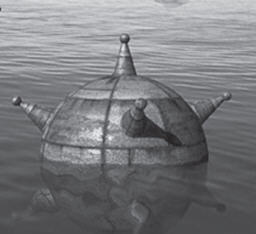Philosophical analysis of the term "mine"
A memory is a mine in three senses of the word "mine".

1. "Mine" refers to an explosive device that explodes on contact The memories of our past bad habits are like mines implanted in our consciousness. At a slight provocation, these memories explode into uncontrollable desires that destroy our intellugence and force us to act shamefully. Thus for a drunkard struggling to become sober, the sighht of a liqour bottle is a mine that causes an explosive relapse into alcoholism. Just as a trained general is essential to safely cross a dangerous mine field, a bona fide spiritual master is indispensable to navigate the journey of life, infested as it is with the mines of explosive memories.
2. "Mine" also refers to an excavation in the earth from which ores and minerals are extracted. In spiritual life, the devotional memory of God, Krsna, is the ultimate treasure mine. Just as we get some joy by thinking of someone whom we love, similarly the devotees experience the supreme happiness by cherishing and relishing the loving memory of the all attractive, all loving, all merciful Lord Krsna. In the classic scripture, the Srimad Bhagavatam, celebrated as the magnum opus of divine love, a devotee prays, "My dear Lord, I will not give up your remembrance for a moment or even half a moment in exchange for any earthly, or even heavenly, treasure." Such devotional intensity may appear incomprehensible to most of us. That's because we have never given ourselves a chance to taste the ineffable joy of divine remembrance, although that joy is always at our tongue tips; it can be attained simply by attentive chanting of the names of God like the Hare Krsna maha-mantra. Actually, the treasure of divine love is our original birthright as souls, as the beloved children of God. Unfortunately, we have forgotten our internal treasure and are chasing external pleasures in vain.
3. "Mine" as a pronoun also means "belonging to me." It is for each one of us to decide: "Which memory am I going to treasure as mine the materialistic or the devotional?"
It is a sad fact that generally our mind delights in worldly memories and neglects divine memories. That's why the Bhagavad-gita (6.6) describes the uncontrolled mind to be an intractable enemy. A worldly enemy can be dealt with by sama (friendship), dam a (gifts), bheda (divide and rule) and danda (punishment). But, as far as the mind's proclivity toward base pleasures is concerned, it needs to be dealt with only by danda, by unflinching, rigorous self-discipline.
The path to victory over the mind will take us through five progressive states of awareness, as explained in Patanjali's Yoga-Sutra:
1. Mudha (deluded, as in sleep, laziness or dullness)
2. Ksipta (agitated, as in stress or mania)
3. Viksipta (distracted, as in a lecture in a noisy environment)
4. Ekagrata (concentrated, as in a serious student revising an hour before the exam)
5. Niradha (controlled, as in a devotee absorbed in samadhi, the trance of love)

SriIa Prabhupada, the founder of ISKCON, compared the process of controlling the mind to that of taming alion. When the trainer starves a lion, it may roar louder than usual, but it is actually becoming weaker than normal. And by persistently starving the lion, it can be made obedient to the trainer's instructions. Similarly, when we starve the mind, that is, when we refuse to pander to its demands for immoral, unhealthy pleasures, it starts agitating more than normal. Many people become disheartened by this increased mental tumult and give up. But rich premiums await the courageous few who refuse to be cowed down by the mind's scaring tactics. We can be among those spiritual adventurers by determinedly beating down the recalcitrant mind into silence and submission by philosophical conviction and devotional meditation. Then the mine of the heart will yield us the treasures of unshakeable, unending peace and bliss.
Caitanya Carana Dasa holds a degree in electronics and telecommunications engineering and serves fulltime at ISKCON Pune. To subscribe to his free cyber magazine, visit thespiritualscientist.com
